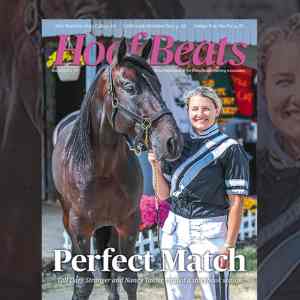Seeing Double: Orphaned Foal Makes A Happy Family Of Three
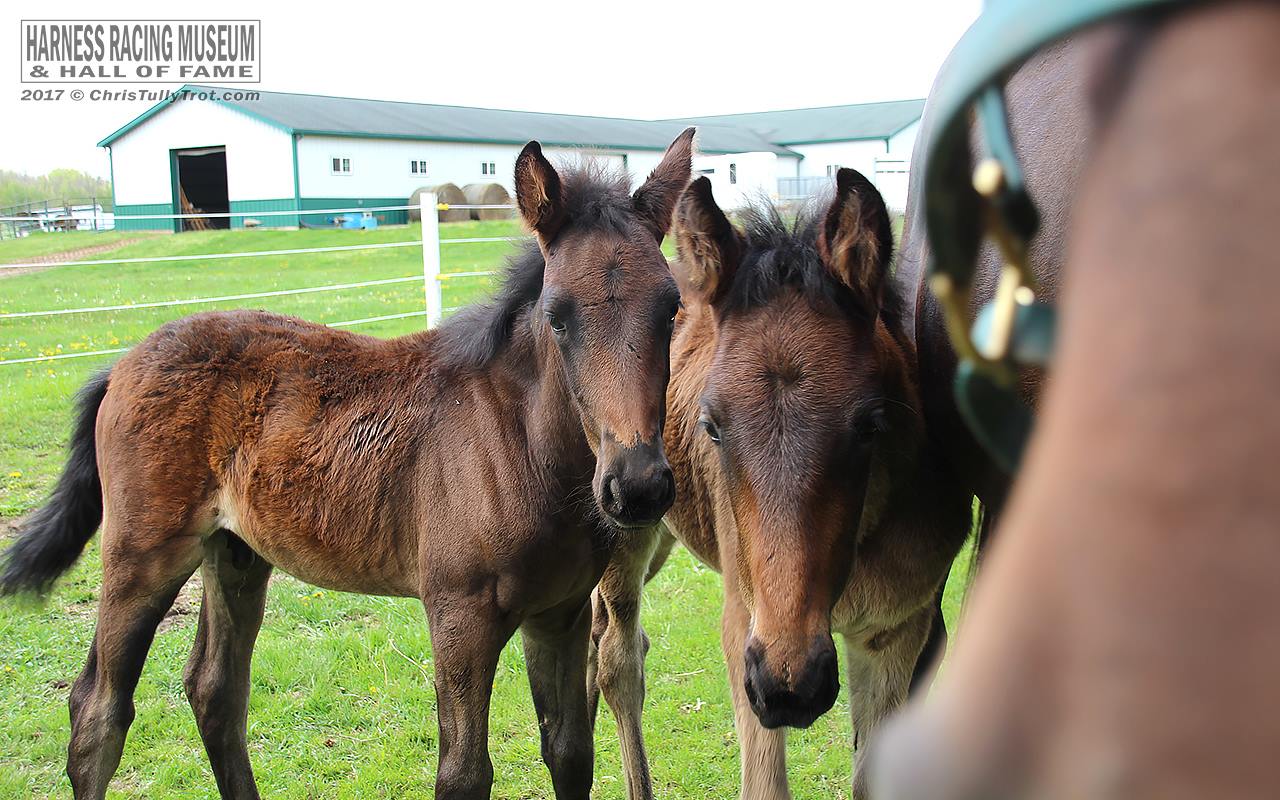
A story that could have been tragic found a happy ending when AB’s Super Hall accepted the orphaned colt as her own alongside her biological foal. Chris Tully photo.
When a mare is in distress, her foal is in distress. When Fantasy Bar Maple was losing her battle with life-threatening complications from foaling, her four-day-old colt was suddenly facing an unclear future.
The colt, by trotting sire Hard Rock N Roll, had a few things going for him after his mother’s sudden death. He was in good health, having enjoyed the benefits of colostrum and a few days of milk from his dam. He was also in good hands, being cared for by a Michigan breeder with 25 years in the Standardbred industry. A calculated risk by the latter would more than double his chances of growing up to be a racehorse.
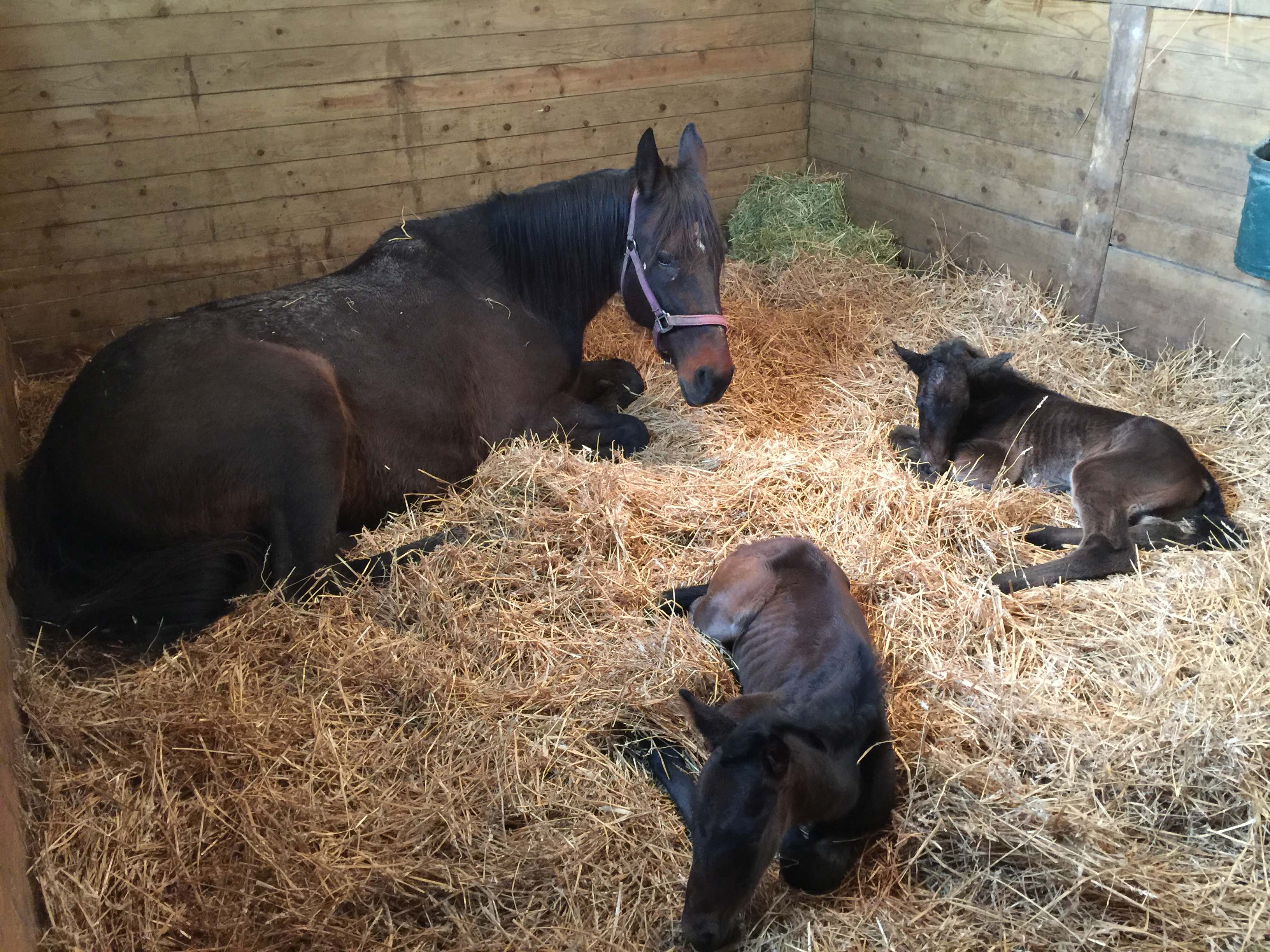
Photo courtesy of Libby Myers.
Libby Myers, who operates Snow Ridge Farm in Clark Lake with her husband, Mike, said she was contacted by Fantasy Bar Maple’s owners when it became clear the mare was in serious trouble. The Above The Bar mare foaled on Feb. 28, but complications followed.
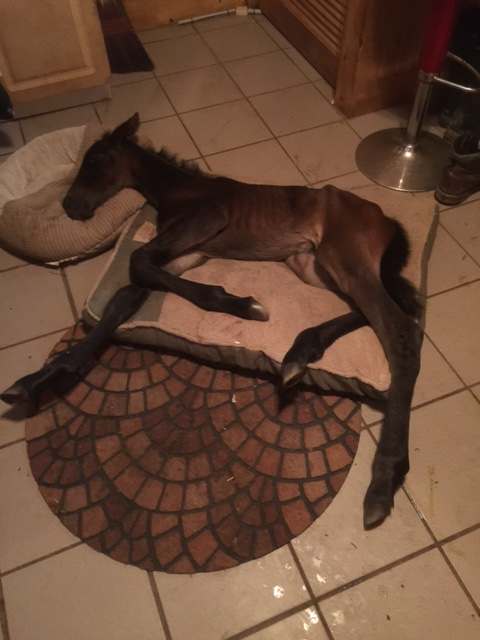
The orphan foal spent the night on a dog bed after his dam died. Photo courtesy of Libby Myers.
“She prolapsed her rectum and retained her placenta at the same time,” she said. “I had told him [Harvey Byler, the mare’s owner], ‘Harvey, just get her down here, OK?’ I just wanted to help him with the foal, in case they lost the mare, and I could feed it every two hours.”
Fantasy Bar Maple died on March 4, despite the veterinary attention she received.
“My vet came out and oiled her, because she then had an impaction, in which her rectum quit working,” said Myers. “We oiled her three days in a row, front and back, and couldn’t get it to pass.”
Predicting the worst outcome, Myers had already made a trip to nearby St. John’s in preparation to feed a hungry orphan colt, picking up 2-1/2 gallons of goat milk.
“There used to be a lot of people that milked goats, but I couldn’t find any,” said Myers. “That’s why I had to meet [Wil and Saloma Byler, son and daughter-in-law of Harvey Byler] up in St. John’s to get milk. So I’m fretting, because I hated to lose this perfect baby. There’s no reason he shouldn’t survive.”
As is commonly the case, the colt was unwilling to accept goat’s milk at first; Myers tubed it into his stomach to prevent dehydration, but soon ran into another problem.
“I’m up every two hours around the clock, feeding this foal; then I had run out of goat’s milk and was trying to find goat’s milk,” she said. “I couldn’t find it, so I had to get just the mare [milk] replacer. It’s OK, you know, but they say goat’s milk is the best.”
The colt learned to drink from a pan, and later a bucket mounted at chest-height on his stall door. For 3-1/2 days, he consumed reconstituted Land O Lakes Mares Match powder. Then fate intervened in his life again.
“On March 8, at 6 a.m., this other mare, actually one that Harvey [Byler] gave me, foaled her baby,” Myers said. “A colt. We have a camera system so I can watch it from home. So I threw on my clothes and rushed out there.”
ABs Super Hall was recuperating on the stall floor, her newborn nearby but still unacknowledged, when the horsewoman realized she had one chance to attempt the improbable—introducing the orphan foal to the mare, and hoping that ABs Super Hall would consider him one of her own offspring.
Myers recounted carrying the 70 lb. colt to the stall in which new mother and baby were gradually gaining alertness.
“My husband had already gone to work,” Myers said. “I said, ‘This is either going to be good, or it’s going to be bad!’”
ABs Super Hall was on her feet by the time Myers managed to carry the orphan the 60 feet it took to reach her stall. Working quickly and alone, Myers took the towel that she had used to rub down the new foal when it first came out and acted quickly.
“I took that towel with placenta or amniotic fluid on it, and I rubbed that [orphan] baby down with it quickly, in the face, because I knew that would be where she’d smell him first,” she said. “Then I rubbed his body quickly and I just laid the towel over the baby’s back. I did it right in the stall doorway, in case I had to make a quick exit with the foal if she didn’t like him.”
The Super Catch mare approached; Myers braced herself for what would come next.
“She went over and blew in his nose and nickered to the foal,” she said. “I thought, ‘Oh my gosh—this is going to be OK.’”
Myers watched the scene unfold, ready to step in if it appeared ABs Super Hall would reject her own foal in favor of Fantasy Bar Maple’s son.
“She would go back and forth,” she said. “The orphan foal went right to nursing.”
Myers next took steps to prevent the older colt from consuming most of ABs Super Hall’s precious colostrum.
“I got a bottle and I got 22 ounces of colostrum and fed that to the new foal that was still on the ground,” she said. “I made a phone call to my vet [Dr. Greg Crosley] and I said, ‘Is the colostrum going to be enough for this [newborn] foal? Is 25-30 ounces enough?’ And the vet says ‘That’s plenty.’ So he got his colostrum.”
With the psychological hurdle of acceptance now behind the new family of three, Myers said she took care to provide adequate nutrition for ABs Super Hall’s extra lactation. Although the 14-year-old broodmare is large and an easy keeper, the physical demands of feeding her two sons called for supplemental nutrition.
“We grain her—she probably gets five, six, seven scoops [daily],” said Myers. “Whenever we think to, we throw her a scoop of grain [Strategy, plus another premium Purina pellet]. I went and got the highest-protein and -fat grain I could find.”
The mare’s caloric intake—and milk—are further enriched by Myers’ choice of hay.
“She’s on second- and third-cutting hay, real high-protein [alfalfa] hay,” she said. “She’s not on a grass hay. We’re feeding her the best we think we know how.”
And it’s working.
“Thank goodness, because we have a couple of mares that can hardly handle their own foals—they get sucked-down, you know?” explained the three-time Michigan Breeder of the Year Award winner. “This mare here, she’s as fat as can be. You don’t see any ribs or backbone; she’s just a chunky gal with two kids on her!”
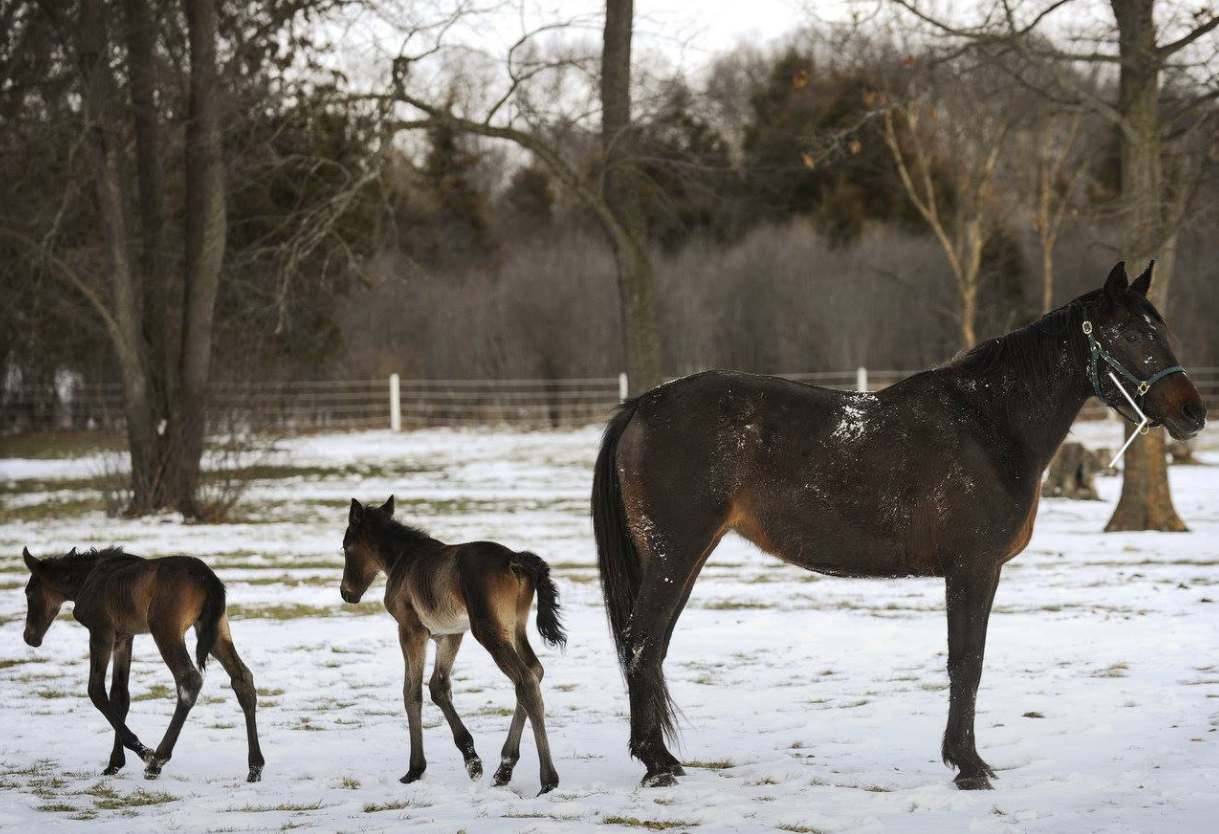
AB’s Super Hall with her happy and healthy family. Photo courtesy of Libby Myers.
ABs Super Hall’s maternal nature and Myers’ quick thinking combined to spare Fantasy Bar Maple’s colt the uncertain fate of most orphans. The Snow Ridge Farm owner said she looked into leasing a nurse mare, although that option would have meant added cost ($2,000; $600 refundable on return of the mare) and the delay of transporting the mare from Kentucky to Michigan. People suggested putting a goat in the stall with the motherless colt, an option rejected by Myers.
“Not all goats will accept a foal,” she said. “That goat could head-butt that baby and hurt him, and he’s not going to be able to reach down and nurse off that goat—it’s too low.”
The breeder said that a foal needs its mother for important reasons, beyond the dam’s milk.
“I have no doubt that [the orphan] would have survived, but he needed to be raised like a horse and taught manners by his mom,” she said. “If you’ve been around foals, you’ll see them fool around while they’re nursing and their mom will reach over and bite them. A lot of people will say ‘That’s not nice!’ to the mare, but she’s teaching them manners.”
Mares accepting orphaned foals alongside their own are rare enough that in 2016, Ontario broodmare Emprize Hanover was the focus of worldwide attention and headlines that went beyond harness racing media. The High Stakes Farm mare reared her own biological filly alongside an orphaned colt. Both flourished.
Myers agreed that watching ABs Super Hall and the two colts at her side is a rare experience.
“At one time, they will be one on one side, and one on the other. There are times when they are both trying to get the same nipple,” she said with a laugh.
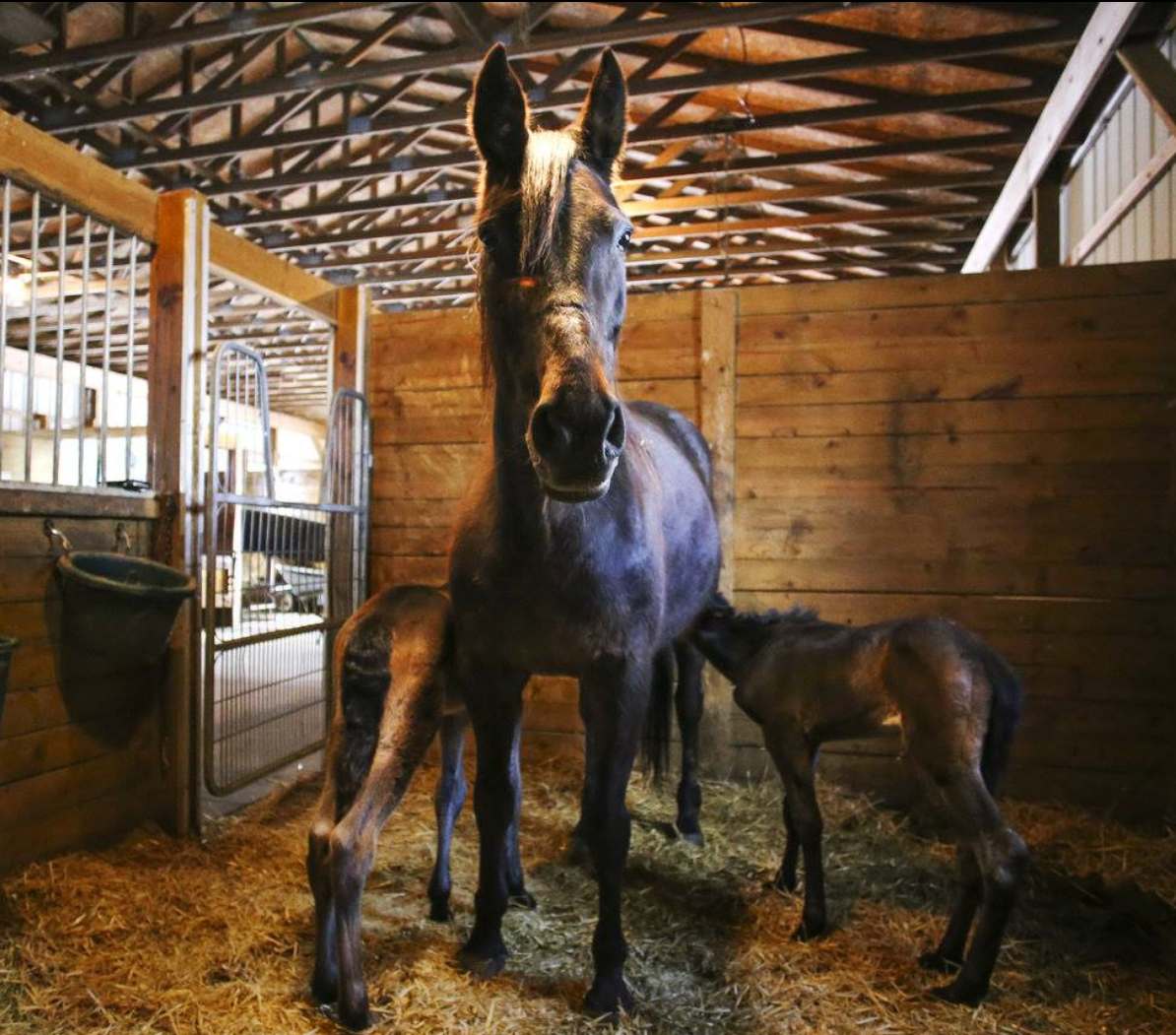
AB’s Super Hall has enough maternal love, and milk, to go around. Photo courtesy of Libby Myers.
Even as an experienced breeder with 23 broodmares under her supervision, Myers said she couldn’t predict how ABs Super Hall would handle the unique situation.
“Never one time did she act like that wasn’t her kid,” she said. “But you don’t really know until you have experiences like this, what they are going to be like, even with their own foal.”
The mare did not receive oxytocin to encourage milk production, nor did she require any intervention after the initial introduction to her adopted son, added Myers.
“When we go to put them out—we’ve put them outside like three or four times [as of mid-March] —she will go with one foal and if the other one’s not there, she’ll stop and nicker and call them both,” she said. “It’s just remarkable, really.”
This article by Melissa Keith originally appeared in the May 2017 edition of Hoof Beats magazine. For more stories like this, visit www.hoofbeatsmagazine.com.

